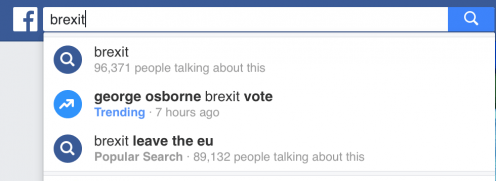Social Media and Brexit
By Daniel Miller, on 27 June 2016

One of the common claims made about social media is that it has facilitated a new form of political intervention aligned with the practices and inclinations of the young. Last week I attended the launch of an extremely good book by Henry Jenkins and his colleagues called By Any Media Necessary which documents how young people use social and other media to become politically involved, demonstrating that this is real politics not merely ‘slacktivism’, a mere substitute for such political involvement.
And yet, currently I am seeing social media buzzing with young people advocating a petition to revoke the Brexit vote, which only highlights the absence of a similar ‘buzz’ prior to the vote. I await more scholarly studies in confirmation, but my impression is that we did not see the kind of massive activist campaign by young people to prevent Brexit that we saw with campaigns behind Bernie Sanders in the US and Jeremy Corbyn in the UK.
The failure to create an attractive activist-led mass social media campaign to get young people to vote for Remain is reflected in the figures; although 18-24 year-olds were the most favourable segment towards Remain, only 36% of this group actually voted at all. As such, Brexit represents a catastrophic failure in young people’s social media, from which we need to learn. Being based in ethnography, our Why We Post project argued that we need to study the absence of politics in ordinary people’s social media as much as focusing on when it does appear. But the key lesson is surely that just because social media can facilitate young people’s involvement in politics doesn’t mean it will, even when that politics impacts upon the young.
One possibility is that social media favours a more radical idealistic agenda. By contrast, even though the impact of Brexit might be greater and more tangible, the remain campaign was led by a conservative prime minister, backing a Europe associate with bureaucracy and corporate interest, and was a messy grouping of people with different ideological perspectives, that made it perhaps less susceptible to the social media mechanisms of aggregated sharing.
At the same time I would claim that our work can help us to understand the result. My own book Social Media in an English Village is centred on the way English people re-purposed social media as a mechanism for keeping ‘others’, and above all one’s neighbours, at a distance. I cannot demonstrate this but I would argue that by supporting Brexit the English were doing in politics at a much larger scale exactly what my book claims they were doing to their neighbours at a local level: expressing a sense that ‘others’ were getting too close and too intrusive and needed to be pushed back to some more appropriate distance. And it is this rationale which may now have devastated the prospects for young people in England.
Hear Daniel Miller talk about social media and politics in this Why We Post podcast.
 Close
Close





